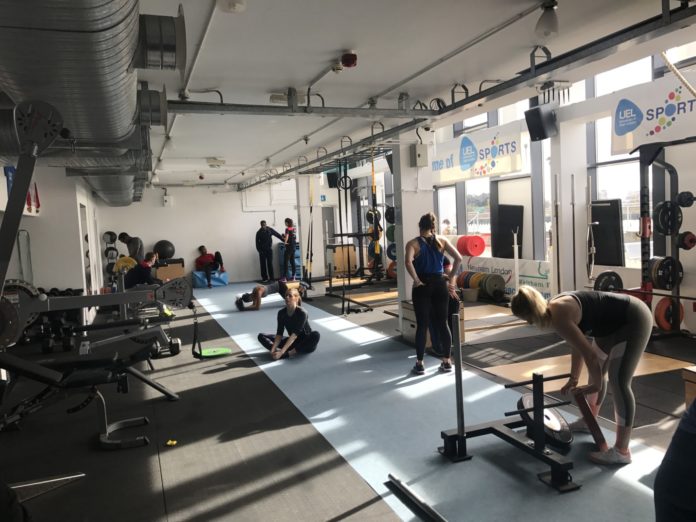When sport was first created, the key element to being good at an activity was to grasp the skill and then apply it in the arena of the sport. As time has developed many things have changed in sports, some may say for the better some may say for the worst.
Sports has become a serious career where some of the top athletes are now paid millions to play and train. As thousands of kids get involved in sports every day, in order for them to make it at the top level they’ll need to be able to do more than kick ups, be able to shoot three throws or have a good first serve in tennis.
This is where strength and conditioning comes into play. Over the last few years sports organisations all over the world have seen the importance of strength and conditioning programs. The work athletes put in the gym could make those millisecond difference to someone winning a gold medal or for strikers to give that extra push to beat their defender for the winning goal.
At UEL it’s no different than at top sporting organizations around the world. Duncan Ogilvie is UEL’s director of strength and conditioning. Ogilvie used to play basketball all over Europe but now trains scholars at UEL who all participate in different sports.
I got to visit him down at the sports dock and he answered a few questions on how he got into strength and conditioning and how its developed over the years.
Q: Why did you get into strength and conditioning?
A: I was previously a professional basketball player and then through my career I started working with strength and conditioning coaches and it was something I really enjoyed pretty much instantly I realized this is something I wanted to do post-basketball. So, when I retired I had already worked towards it so I walked into a job straight after retiring and that was it.
Q: How important is strength and conditioning to athletes?
I’d say its hugely important but you have to realize it’s just one piece of the puzzle, it’s not everything but for athletes to stay robust and resilient to injuries it’s an important piece because if they’re injured they won’t be getting into practice. So, my job is to keep guys healthy so they can go into their technical practice and get better at the actual sports their doing. I just want to provide them with the ability to be more strong and powerful so they can be better technically.
Q: You mentioned that you were a professional basketball player, where did you play?
A: I played in America, I went there for a scholarship to a university. I then represented my country, so I have England caps for the senior team. I played in Spain for three years; a little bit in Greece; a little bit in France for a season and then I spent two years playing in the English league 1 of which I was studying my masters in Manchester.
Q: How important was strength and conditioning when you were playing in the late 90’s?
A: I look back at my professional career and would say it’s a big part which was lacking for me as an athlete and just simply because it wasn’t something used in the late 90’s/ early 2000’s which was my prime years. But when I suffered an injury and worked with a strength and conditioning coach, it changed everything for me it changed my mentality on how to train and the value of doing stuff in the gym.
Q: How can an individual trying to get generally fit benefit from strength and conditioning programs?
A: I believe everyone can benefit from working out like an athlete but not at the same intensity or workloads because it and athlete’s job. But with regards to the general public just the movements that we do; the mobility; the flexibility and understanding how to move correctly will benefit everyone. Cross fits become very popular and has been great to expose the general public to training properly. Some say cross fit is bad but if it’s done properly it can be very beneficial and expose the public to how athletes train.
Obviously when you’re coming into the gym you have a plan you have to have a focus and if you have this you’re going to have a better chance at improving.
Q: Lastly do you have an special tips for your athletes?
A: I’d like to think what I have the volleyball players do would be different to what the basketball player would do or the track and field athletes but there’s a big staple which is very similar. Having a very strong trunk and lower body so glutes and hamstring will have great benefits for the majority of sports I work with. But ultimately you’ve got to want to do it, so if it’s a chore and you’re not wanting to put the extra hours to get better there’s no point. You’ve got to have a drive to want to do it and if you have that then sky’s the limit really.
UEL scholars benefit from Duncan and the rest of the SCC coaching staff training throughout the week. Only time will tell how much more this sector in the sports will grow, but what clear is everyone can profit from this kind of training.




